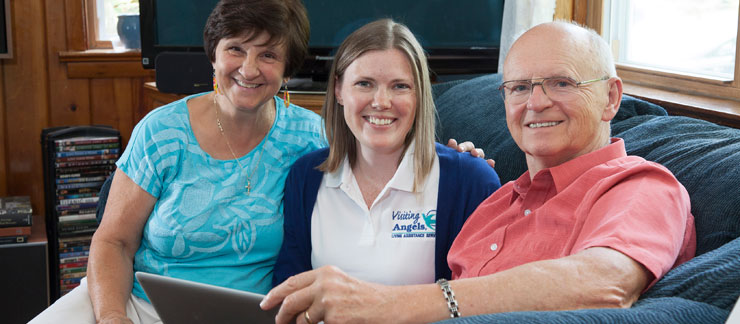
How to Work with a Parent's Caregiver
The parent-child relationship will eventually begin its 180-degree turn. This can happen gradually -- or overnight -- as your loved one starts to need more supervised assistance, or even during an emergency situation.. Whether slowly or suddenly, when you become the caregiver for your parent, it’s your new normal.
The Caregiver Role
Being a caregiver is a challenge for which few are prepared. It’s a role reversal. When the person who cared for you as a child struggles with mobility, memory, managing their medications, or personal hygiene, you must protect them while preserving their dignity. It is a delicate balance.
Your parents will probably not tell you they need help. You’ll have to come to your own conclusions based on observations. Some questions you can ask yourself, include:
- Are they capably performing routine activities like bathing and grooming?
- Does it appear they are losing weight because they aren’t food shopping or eating well?
- Has their home’s exterior fallen into disrepair, or is the interior not being maintained?
- Do you see bruises on their body consistent with a fall?
- Is there a stack of unpaid bills?
- Have they lost interest in things they once enjoyed?
Then you must ask yourself, “Can I do this alone?” Or do you introduce a professional caregiver into the equation?
Introducing a Professional Caregiver
First, make detailed notes about what you’ve observed as well as a list of concerns. Be certain you have their full medication list and an up-to-date medical history.
Then, take advantage of a complimentary consultation with your local Visiting Angels office to discuss what types of caregiver services can fulfill those needs. You may or may not want to include your parent at this juncture. This consultation could serve as an additional fact-finding session as you get advice from our Care Coordinators.
Beyond the day-to-day needs, other relevant discussion points should include:
- Agreement on the best contact methods if you have a question
- Clarification of the reporting expectations about your parent’s progress
- Understanding how you can be a contributing member to the effort
- Identification of the point person in your family to maintain effective communication
Once you are armed with some information, speak to your parent privately, no need for them to feel like there’s a conspiracy. This may not be an easy conversation, but you need to let them know you love your role as their son or daughter and don’t want that or where they live, to change. We all need assistance in our lives for a variety of things. This is one of them.
Aging in Place
According to the CDC, aging in place with a caregiver is, “The ability to live in one’s own home and community safely, independently, and comfortably, regardless of age, income, or ability level.”
With a caregiver on the job, you no longer have to stress and run every errand. Instead, you can stop in after work to take your mom to dinner or stay in and watch a movie together. What you’ll find at the end of the day is some balance restored.
Helping your loved one remain in a familiar environment surrounded by their cherished possessions is attainable with caregiver support. Once your parent can live life on their own terms (with a little help), you might be surprised how quickly they acclimate.
At Visiting Angels®, we understand the power of a team when it’s focused on the same objectives. To request a free in-home consultation, and find out more about our caregiver services, contact your nearest office today.


